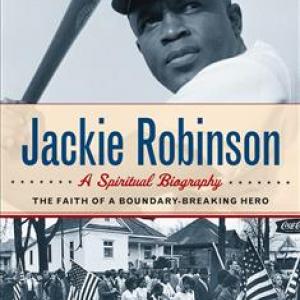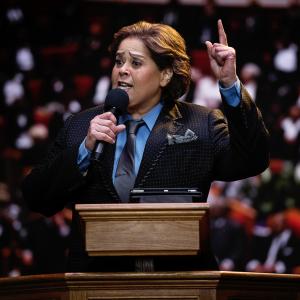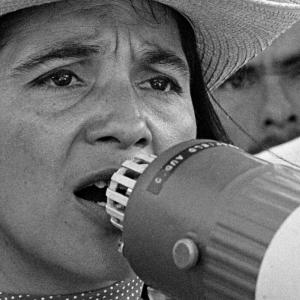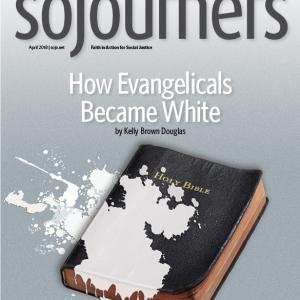Posts By This Author
New & Noteworthy

A scene from outside the Pulse nightclub, October 2016. Miami2you / Shutterstock.com
Piety’s Dark Side
Love the Sinner is a short documentary narrated by queer filmmaker Jessica Devaney, who grew up in a conservative evangelical church. In the wake of the 2016 Pulse nightclub shooting, she takes a hard look at the connection between Christianity and homophobia. lovethesinnerfilm.com
Crisis and Conscience
Simone Campbell, Kelly Brown Douglas, Jacqueline M. Hildago, George “Tink” Tinker, Kwok Pui-lan, Jim Wallis, and others write about the “confessional crisis” of our political era and possible faithful responses in Faith and Resistance in the Age of Trump. Edited by Miguel A. De La Torre. Orbis
A Lifetime Adventure
Calling All Years Good: Christian Vocation throughout Life’s Seasons explores calling as something we wrestle with not just as young adults but “from infancy to old age,” combining social science insights with practical theology. Edited by Kathleen A. Cahalan and Bonnie J. Miller-McLemore. Eerdmans
Hard-Won Wisdom
John M. Perkins, co-founder of the Christian Community Development Association, has spent decades working for a gospel that is inseparable from racial and economic justice. In the memoir Dream With Me: Race, Love, and the Struggle We Must Win, he reminds us, “It all comes down to love.” Baker Books
Letters to the Editor
Eye of the Beholder
In “Where Protestantism Went Wrong” (February 2017), Wesley Granberg-Michaelson rightly critiques some of the consequences of the Reformation. Surely he is inaccurate, however, in arguing that “the Reformation bred a mistrust of aesthetics.” It would be more accurate to state that it promoted a different aesthetic than that prevalent in Catholicism. New England Puritans, for example, developed a “plain style” in literature and architecture evident in the accessible prose of William Bradford’s Of Plymouth Plantation and the beauty of many Congregational churches still standing in town squares. This plain style influenced modern literature and the “form follows function” aesthetic of much modern architecture. Sometimes, to quote a fine expression of the Protestant aesthetic, “ ’tis a gift to be simple.”
Walter Hesford
Moscow, Idaho
Name Drop
Jim Wallis has asked the question that I, and I am sure others, have been wrestling with for some time: “What is an evangelical?” (“White Evangelicals and the Election,” January 2017). As an 81-year-old Lutheran pastor, I have been advocating that the Evangelical Lutheran Church in America drop the word “evangelical” from our name. The word has been hijacked; the original meaning has been perverted! Retaining the word in our church’s name distorts the very heart of our identity. The change should not be that significant for Lutherans; when “evangelicals” meet, the ELCA is usually absent. It is sad but true that other words must be employed to convey the powerful identity that the word evangelical once held.
Bernard Kern
North Richland Hills, Texas
Stick to the Facts
I was disappointed in your January 2017 issue’s exclusive focus on the danger Trump poses because of a “racist, misogynistic, ethnocentric brand of nationalism” and policies that likely will hurt poor, vulnerable people (“Is America Possible?” by Heath W. Carter). What of his cavalier attitude toward facts, evidence, and truth, such as his disputing the overwhelming scientific evidence for human-caused global warming? When our culture is on a binge of finding “truth” in unwarranted places, and people are believing what they want to believe no matter how far off the mark (with the encouragement of our president), our democracy is in serious, long-term danger.
Roger Brooks
Madison, Wisconsin
Stop Talking
In David Gushee’s November 2016 piece on abortion (“The Abortion Impasse”), where are women’s voices? Where is the acknowledgment that there are no women’s voices here? Gushee supports not banning abortion. In some cases. I get that. But the rhetoric, implicit and explicit, embodied in such statements and phrases as “abortion is the sad song that never ends,” “the everyday ‘garden variety abortions’ go on and on,” and “that miserable drive to the abortion clinic” send chills of exclusivity, domination, privilege down this reader’s spine. “What is an anxious Christian to do about all this?” Listen to women’s and girls’ stories. Listen. And listen. And listen.
Priscilla Atkins
Holland, Michigan
New & Noteworthy
An Enduring Voice
Theologian of Resistance: The Life and Thought of Dietrich Bonhoeffer, by Christiane Tietz, is an accessible and compact biography of this German theologian, executed by the Nazis, whose writings on Christian community, resistance, and conscience hold continuing power in our times. Fortress Press
Come Together
Deidra Riggs explores God’s call to love in a way that crosses all divisions (even race and political affiliation) in One: United in a Divided World. She reflects on the aftermath of police shootings of black men as well as the fissures in everyday life. BakerBooks
Song and Poetry
The two-volume Celebrating Wendell Berry in Music features essayist, poet, and farmer Berry reading his work, music by Grammy-nominated bluesman Eric Bibb, and choral and art song settings by composer Andrew Maxfield based on Berry’s work. Volume 2, All the Earth Shall Sing, was recently released.
wendellberrymusic.org
We Gon’ Be Alright
Stakes Is High: Race, Faith, and Hope for America is a collection of essays by A.M.E. pastor, Huffington Post contributor, and social commentator Michael W. Waters. He is both blunt and lyrical as he meditates on police violence, racism, hip-hop, and the power of faith. Chalice Press
Letters to the Editor
Veterans’ Affairs
Wonderful to see Standing Rock featured on the front cover and within the February 2017 issue (“A Chorus of Resistance,” by Gregg Brekke). One other moment people might have missed: Some among the thousands of veterans supporting the water protectors went down on their knees to apologize for the atrocities committed by Army units against the Sioux people over the centuries of white hegemony. The elders forgave them. I, for one, wept at the grace of this.
Katharine Preston
Essex, New York
Where Two or More Are Gathered ...
There are some things in the article “Where Protestantism Went Wrong” (by Wesley Granberg-Michaelson, February 2017) that leave me unsettled. The article seems to indicate that a single person (a bishop or whomever) is a better arbiter of the truth than a council or a group (presbytery, synod, etc.). By declaring the priesthood of all believers, the Reformation raised up the importance of all people—educated, ordinary, or otherwise. My experience has been that, on the whole, a council or group is more likely to arrive at a truthful, correct, or workable solution to whatever issue is before them than any one individual in the group.
Mike Smathers
Crossville, Tennessee
‘Duck’ And Cover?
I finished my reading of Rose Marie Berger’s “Mosquito Manifesto” (February 2017) with a positive feeling. Almost immediately, however, another image flashed through my mind: a short cartoon in which Donald Duck goes on vacation. Sitting in his lounge chair on the lawn, relaxing at last, Donald is set upon by a lone mosquito. Those who know the temperament of Donald Duck can guess the outcome. The final scene shows the mosquito escaping into the sky as Donald destroys his mountain cabin with shotgun blasts in a last vain attempt to rid the world of this pesky mosquito.
Is there not a real danger that instead of bringing down the giant, Lilliputian style, we mosquitos might actually provoke annihilation, not just of ourselves but of many unintended victims of the wrath of the powerful who will not care who they hurt in their attempts to rid the world of us?
David Tidball
Roseville, Minnesota
Not Alter Egos
In the February 2017 issue of Sojourners, Will Willimon makes an excellent case for the need to address racism from the pulpit (“Preaching the Devil Out”). However, as a Christian mental health professional, I disagree with his contrast between preaching and psychotherapy. I agree the two are separate, but one is not inferior to the other. Willimon characterizes psychotherapy as a luxury only privileged people use. This is based on historical fact, dating back to Freud, when psychoanalysis was provided only to the very richest. Today, however, mental health is constantly striving to be available to the poor and culturally diverse. I can think of no other institution, including the American church, that is more dedicated in practice to understanding and spreading unity among diverse people groups. I suggest that therapists and pastors pursue this goal together, using our unique talents in tandem, instead of trying to become an alternative to the other.
Nick Schollars
via email
“On the other hand…” Write to letters@sojo.net or Letters, Sojourners, 408 C Street NE, Washington, DC 20002. Include your name, city, and state. Letters may be edited.
New & Notworthy
Prison Nightmares
Rikers: An American Jail , a documentary film from journalist Bill Moyers, draws on interviews with former detainees at a notorious facility, New York City’s Rikers Island, for insight into the violence and futility of U.S. mass incarceration. Airing on PBS in May, with faith-based viewers’ guide available for download. rikersfilm.org
Not Just a Game
Jackie Robinson: A Spiritual Biography , by Michael G. Long and Chris Lamb, details how faith helped Robinson, the first black baseball player in the major leagues, endure abuse and fight for civil rights, on and off the field. WJK
Mind the Gap
Economist Thomas Piketty’s landmark 2014 book on growing wealth inequality, Capital in the Twenty-First Century, is brilliant, but daunting at more than 600 pages. Enter Pocket Piketty, by inequality data specialist Jesper Roine, a portable and accessible introduction to Piketty’s vital and evermore-timely ideas and analysis. OR Books
Love and Dissent
With both love songs and protest anthems such as “Corrupción,” Ani Cordero’s new Latin rock album, Querido Mundo (Dear World), is a full-hearted call to embrace life and social justice in the face of disturbing politics in the U.S. and around the world. anicordero.info
Letters to the Editor
Unfounded Intimations?
Responding to the recent Sojourners article by Ryan Rodrick Beiler (“Undeterred by the Facts,” February 2017) regarding the arrest and detention of World Vision Gaza Director Mohammed el-Halabi, I would like to clarify the following pertinent issues.
El-Halabi has been indicted on charges of membership in a terror organization, use of material goods for terror, providing intelligence and material aid to the enemy in wartime, and illegal possession of arms and ammunition. If a plea deal will not be agreed between the sides, the Israeli state prosecution will present evidence on all these charges in a manner consistent with due process, fair trial, and maximum possible transparency given security considerations.
Hence, it is hard to understand Rodrick Beiler’s conclusion that Israel is “undeterred by the facts.” The case will move forward based only on evidentiary fact. Beiler also questions why Israel would level such charges against a Christian aid organization. The only reason is that, unfortunately, due to lack of adequate oversight, the charges appear to be true. This is probably why Western donor countries have suspended aid to World Vision Gaza operations pending trial.
We also reject and totally deny the unfounded intimations in Rodrick Beiler’s report that el-Halabi has been mistreated in Israeli custody. This is not the case. El-Halabi has also had access at all times to professional medical care and has been visited by his attorneys and family.
Itai Bardov
Embassy of Israel
Washington, D.C.
Ryan Rodrick Beiler Responds:
Itai Bardov writes at length about the fair trial that Mohammed el-Halabi will be granted by the Israeli legal system. He then declares that “the charges appear to be true.” This is consistent with the Israeli foreign ministry’s campaign, as described in my article, to hype el-Halabi’s presumed guilt long before due process has had the chance to take its course.
Recent and extensive documentation by international, Israeli, and Palestinian human rights organizations (Amnesty International, Human Rights Watch, B’Tselem, Al Haq, and others) has indicated routine use of torture and other forms of abuse of Palestinians within the Israeli legal system, adding credibility to el-Halabi’s allegations of such treatment.
Regarding el-Halabi’s alleged crimes, and the claim that “Western donor countries have suspended aid” to World Vision, I would direct Bardov to the recent investigation conducted by the Australian government’s Department of Foreign Affairs and Trade, which “uncovered nothing to suggest any diversion of government funds” on the part of el-Halabi.
While it is doubtful that the Israeli legal system will offer el-Halabi a “fair trial and maximum possible transparency,” as Bardov claims, it is certain that World Vision, the Australian government, and the international human rights community present a very different narrative from that offered by Netanyahu’s right-wing Israeli government. Whom will you believe?
Correction: Our May 2017 issue credited climate change research to the Yale Program on Climate Change Communication. The surveys were actually a partnership between George Mason University’s Center for Climate Change Communication and the Yale program.
“On the other hand…” Write to letters@sojo.net or Letters, Sojourners, 408 C Street NE, Washington, DC 20002. Include your name, city, and state. Letters may be edited.
Letters to the Editor
Unchaining Hope
Thank you for uplifting one of North America’s most prophetic and inspirational persons of our time, Daniel Berrigan, SJ (“The Unchained Life of Daniel Berrigan,” August 2016). He was one of the most hopeful people for change in a time and an era when many of us felt little hope for change in the status quo. I never met him personally but was inspired by both who he was as a person and his commitment to a theology of personal involvement and activism for peacemaking.
John Fogleman
Ontario, Canada
Shame and Blame
Jim Wallis’ analysis of “intersectionality” (“The Categories That Divide Humanity,” July 2016) felt to me like an attack on local, traditional cultures, particularly those that are “white.” As a lifelong rural pastor, I know well the propensity of rural communities toward ethnocentrism. And within the context of American society, all white traditional cultures certainly bear the burden of racism. But the solution is not to dismantle all local, traditional cultures, but to fashion communities that value their heritage along with the heritage of all other cultures. Wallis’ shame-and-blame language not only fails to effect positive change in local, traditional cultures but also may well be the kind of “politically correct” discourse that drives traditional “whites” to embrace political demagogues.
S. Roy Kaufman
Freeman, South Dakota
New & Noteworthy

Courtesy of disturbingthepeacefilm.com
Choosing a Different Way
The documentary film Disturbing the Peace describes the path former Israeli soldiers and Palestinian fighters took from armed conflict to nonviolent peace activism, resulting in the creation of Combatants for Peace. A model for overcoming polarization and rejecting violence, in an unlikely place. disturbingthepeacefilm.com
Faith Remix
Author Melvin Bray presents a creative, questioning, culturally engaged approach to our sacred stories as a path to a stronger, more just, and loving faith. Better: Waking Up to Who We Could Be is a resource for Christians “for whom uncritical certitude is no longer working.” Chalice Press
Displaced People
Global Migration: What’s Happening, Why, and a Just Response explains key issues linked to contemporary migration and practical responses, guided by principles of Catholic social teaching. By Elizabeth W. Collier and Charles R. Strain with input from Catholic Relief Services. Anselm Academic
Prophets of Profit
In Brand® New Theology: The Wal-Martization of T.D. Jakes and the New Black Church , Paula L. McGee encourages pastors and scholars to see prosperity churches as a formidable force. She explores such churches’ troubling interweaving of commerce and faith and how they disempower their majority-female congregations. Orbis Books
New & Noteworthy
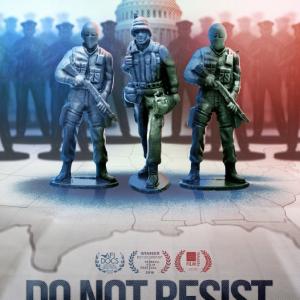
Image from IMDB.com
Forcing the Law
Do Not Resist , the 2016 Tribeca Film Festival’s Best Documentary winner, directed by Craig Atkinson, is a critical glimpse into the militarization of policing in the U.S. Where will hyped-up police training, battle armor, weaponry, and surveillance technology take us? Vanish Films
Inquiring Minds
Wary of science, or seeking a way to engage those who are? How I Changed My Mind About Evolution: Evangelicals Reflect on Faith and Science gathers stories from pastors, biblical scholars, theologians, and scientists. Edited by Kathryn Applegate and J.B. Stump. IVP Academic
Just Insights
In Radical Dharma: Talking Race, Love, and Liberation, Rev. angel Kyodo williams, Lama Rod Owens, and Jasmine Syedullah are igniting conversations in Buddhist communities around the country about the legacy of racial injustice and white supremacy in their religion. North Atlantic Books
Worldly Prayer
Through diverse writers and his own experience, Orthodox priest Michael Plekon looks beyond the formal and liturgical in Uncommon Prayer: Prayer in Everyday Experience. What are the permutations of the “Prayer of Pierogi Making”? Why should we not fear the “Prayer of Darkness”? Notre Dame Press
Seven Elements of Just Peace

Ivonne Wierink / Shutterstock
In April 2016, Roman Catholics from around the world gathered at the Vatican to discuss how the church might embrace the principles of nonviolence and just peace more deeply (see "Game Changer?" in the December 2016 issue of Sojourners.)
And what does "just peace" include? Here are seven key principles:
Just cause: protecting, defending, and restoring the fundamental dignity of all human life and the common good
Right intention: aiming to create a positive peace
Participatory process: respecting human dignity by including societal stakeholders—state and nonstate actors as well as previous parties to the conflict
Right relationship: creating or restoring just social relationships both vertically and horizontally; strategic systemic change requires that horizontal and vertical relationships move in tandem on an equal basis
Reconciliation: a concept of justice that envisions a holistic healing of the wounds of war
Restoration: repair of the material, psychological, and spiritual human infrastructure
Sustainability: developing structures that can help peace endure over time
Adapted from “What Kind of Peace Do We Seek?” by Maryann Cusimano Love, associate professor of international relations at the Catholic University of America, in Peacebuilding (Orbis Books, 2010).
Letters to the Editor
A Red Flag?
Regarding the Episcopal church called “The Cathedral of the Confederacy” (“Robert E. Lee Worshipped Here,” by Betsy Shirley, April 2017): Token efforts of repentance such as the removal of the Confederate flag will not suffice; full biblical repentance requires massive restitution in order to repair the enormous oppression and damage done to African-American people over the centuries.
Lowell Noble
Riceville, Iowa
Spoiler Alert
It’s always great to read about an entrepreneur who shows that justice can be good business (“Grocery Store Inequity,” by Courtney Hall Lee, April 2017). I was interested to read of Jeff Brown’s effort to introduce quality, convenient shopping to low-income areas of Philadelphia because I lived in the southwest Germantown part of that city for two years back in the mid-1980s. I quickly noticed, when visiting the suburbs, that perishable food was much more plentiful and varied and lasted longer than food I bought at the “supermarket” a mile away from my apartment. One can only suppose that low-income folk did not find expensive, quickly spoiled food appealing and, since they didn’t buy it, healthy, fresh food was harder and harder to get. People are too often blamed for their own poor health habits. Please keep informing about the barriers faced in the name of “just business.”
Ann Larson
Essex, Vermont
Spivey’s Still Got It
Regarding “The Trump Presidency, One Year Later,” by Ed Spivey (April 2017): I laughed so many times that my wife wanted to read it! I think humor may be one of the best antidotes for the toxicity of our times. Spivey’s humor is also self-deprecating, which is more effective than the self-righteousness I feel and express so often. Thank you, Ed, for making us laugh while reminding us that we have all sinned and come short of the glory of God.
Charles R. Crawley
Cedar Rapids, Iowa
Don’t Discount Adam Smith
Several points from your interview with Chuck Collins (“Wealth and the Common Good,” March 2017) illustrate the compatibility of his ideas with the economic system of capitalism proposed by Adam Smith. Smith sharply criticized stark economic inequalities. He advocated good wages for workers, writing that efficiencies in the division of labor made it possible to spread wealth even to the lowest ranks of the people. He advocated progressive taxation. And he argued that people were the same—no “myths of deservedness” for Smith. Finally, while Smith did not say anything about campaign finance reform, his excoriating comments on the political power of the wealthy are potent. The clear inference is that the wealthy should not have disproportionate electoral power.
For too long, American political discourse has featured a false dichotomy between capitalism and socialism. This dichotomy has been based on a gross distortion of Smith’s system. It is time to change the conversation to what kind of capitalism would be best for the country and the world: the savage capitalism of recent decades, or the capitalism with justice and equal opportunity that Smith advocated.
John E. Hill
Quincy, Massachusetts
“But what about ...?” Write to letters@sojo.net or Letters, Sojourners, 408 C Street NE, Washington, DC 20002. Include your name, city, and state. Letters may be edited.
From Just War to Just Peace

Lee Nanjoo / Shutterstock.com
1. Continue developing Catholic social teaching on nonviolence. In particular, we call on Pope Francis to share with the world an encyclical on nonviolence and just peace.
2. Integrate gospel nonviolence explicitly into the life, including the sacramental life, and work of the church through dioceses, parishes, agencies, schools, universities, seminaries, religious orders, voluntary associations, and others.
3. Promote nonviolent practices and strategies (e.g., nonviolent resistance, restorative justice, trauma healing, unarmed civilian protection, conflict transformation, and peacebuilding strategies).
4. Initiate a global conversation on nonviolence within the church, with people of other faiths, and with the larger world to respond to the monumental crises of our time with the vision and strategies of nonviolence and just peace.
5. No longer use or teach “just war theory”; continue advocating for the abolition of war and nuclear weapons.
6. Lift up the prophetic voice of the church to challenge unjust world powers and to support and defend those nonviolent activists whose work for peace and justice puts their lives at risk.
The Catholic Nonviolence Initiative is a consortium of attendees from the Rome conference and others who are advocating for a papal encyclical on nonviolence. Read the full statement at nonviolencejustpeace.net.
Letters
Letters to the editors from Sojourners readers.
We Cannot Rest; We Must Rest
HERE'S A PARADOX: If justice delayed is justice denied, we cannot rest while anyone suffers; at the same time, we can’t work tirelessly for justice without rest. It’s the kind of pesky conundrum we face just as we’re settling in for a night of sweatpants and Netflix: The prophets in the Bible decried those who sit on fine couches while their neighbors go hungry ... but does that mean it’s wrong to re-watch the entire season of Queer Eye when we could be doing something more productive?
In this issue, Baptist minister J. Dana Trent uses the fourth commandment (“Remember the Sabbath day, and keep it holy.”) to reframe our quandary. Through this commandment to practice “ritual rest from our labor,” writes Trent, “we opt out of tyranny and opt into care for one another.” At its heart, Sabbath rest isn’t a pause from justice work; it’s a way of disrupting a culture of what Walter Brueggemann describes as “endless desire, endless productivity, and endless restlessness.”
New & Noteworthy: May 2018
From Stage to Screen
Pulitzer Prize finalist Anna Deavere Smith brings her critically acclaimed play Notes from the Field to the screen. Based on hundreds of interviews with students, teachers, parents, and administrators, the production brilliantly highlights the disturbing U.S. school-to-prison pipeline. HBO
Love for Creation
Creation Care: A Biblical Theology of the Natural World presents practical, faithful responses to environmental issues. With scientific data and comprehensive biblical theology, Douglas J. Moo and Jonathan A. Moo invite readers to explore their relationship with creation and the Creator. Zondervan
Letters
Susan Thomas
Tucson, Arizona
New & Noteworthy
Yes, She Can
Dolores Huerta changed the course of history when she formed what became the United Farm Workers union with César Chávez. Often overshadowed by her co-founder, Huerta’s defiant resistance, struggle, and sacrifice take center stage in Peter Bratt’s captivating documentary, Dolores. Premieres March 27 on PBS. doloresthemovie.com
An Emerging Voice
Folk singer Azniv Korkejian was born in Aleppo, Syria, to an Armenian family. Relocated to Saudi Arabia and then to the U.S., Korkejian’s moniker, “Bedouine,” is drawn from the name of a nomadic group. With gentle guitar and smooth vocals, her self-titled debut album affirms her identity as a wanderer. Spacebomb
Letters
The Present Political Quagmire
The February 2018 issue raises big questions for our country and the evangelical church. The authors of “Is This a Bonhoeffer Moment?” (Lori Brandt Hale and Reggie L. Williams) and “When Seminary Becomes a Threat” (Wesley Granberg-Michaelson) rightly point out the risks of making parallels between two different historical contexts (Germany in the 1930s and 21st century America). Yet there are striking similarities, particularly the ease with which evangelical Christians, in America today and in Germany then, accepted populist movements and their nationalistic programs. In both cases, the populist forces were able to exploit societal anxieties and make a sentimental appeal to a cultural form of Christianity that served its purposes.
The slogan of the Nazified German Christians was “Germany our goal, Christ our power!” Based on a distorted interpretation of Lutheran theology, a group of theologians at the time issued a document, known as the Ansbacher Ratschlag, opposing the Barmen Declaration. It was addressed to the National Socialist Evangelical Union of Pastors and included this statement: “... we as believing Christians thank the Lord God that in this hour of need he has given our people the Fuhrer as a ‘good and faithful sovereign,’ and that in the Nationalistic Socialist state he is endeavoring to provide us with disciplined and honorable ‘good government.’” This distant mirror of attitudes—and even words—that are with us today should give Christians great concern. The vulnerability of the American church did not come about in the presidential election of November 2016. The present political quagmire has only exposed it.
Dave Shelman
Corbett, Oregon
Acknowledging Assault
I have just read “‘A Terrorist War Against Women,’” by Serene Jones (February 2018). Reading stories of sexual violence against women gives me hope that something can be done about that evil. But there is one voice that is not heard too often. It is that of sexual violence against men by male authority figures. I suspect there are many men out there who trusted a male authority figure and were assaulted. We are hurting.
Anonymous
On Rage and Apathy
IN THIS ISSUE, Victoria Newton Ford writes about Ava DuVernay’s forthcoming movie adaptation of Madeleine L’Engle’s bestselling fantasy novel A Wrinkle in Time. As in the book, Meg Murry travels through time to find her missing father. But DuVernay, who also directed Selma (2014) and 13th (2016), adds a twist. In the film, Meg and her brother, Charles Wallace, are black. For Ford, this delivers something the novel cannot: “a hero of the universe who, in our current political space and time, is afforded the least agency.” In other words, writes Ford, “Meg is an angry black girl.”
A film that depicts a black protagonist—in all her fury, pain, and love—is especially radical, Ford explains, because America has continually “sought to conscript ... black [women] into a toolbox for the country’s deliverance.” She points to the political heroization of Oprah, Michelle Obama, and the black women voters in Alabama who defeated Roy Moore’s senatorial bid.
New & Noteworthy
A Returning Voice
Songwriter Audrey Assad, daughter of a Syrian refugee, releases her first album of original material in four years. Evergreen features songs about “rebirth, the rebuilding of trust, and the discovery of joy and love.” PledgeMusic
Respect for Refugees
Artist and activist Ai Weiwei brings the global refugee crisis to the big screen through his captivating documentary Human Flow. Filmed in 23 countries, the documentary features stories of desperation, courage, and resilience and speaks to our shared humanity. humanflow.com



